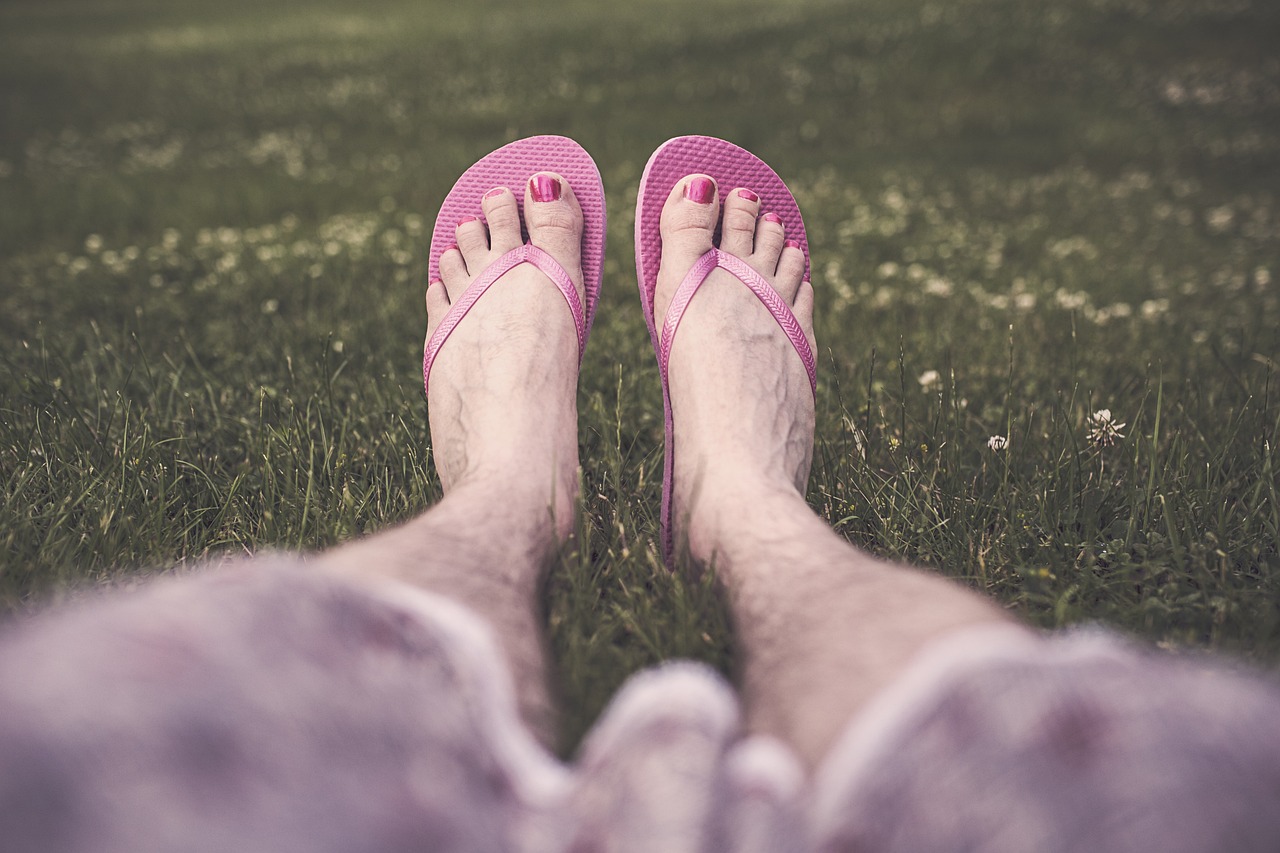Gus very much likes the polished color popping from the tips of his toes. Two nights previous, he bought the polish—christened Sunburst Yellow by the sticker pressed onto the bottom of the bottle—when possessed by desires he never felt before. It simply occurred to him his toes, for the entirety of his life, existed exclusively in common, dull flesh tones. So Gus remedied his missteps by putting burst suns where previously nothing shone.
He is still surprised in moments like these, queued behind others for the next open self-checkout hub, when the brightness from his exposed feet—cozy in their well-worn flip flops—rises to meet his sight. Gus wishes he’d chosen colorful toes over nude ones much, much sooner. He intends to right this wrong with bottle upon bottle of color. Cornflower blues. Flirty reds. Silvers. Golds. Greens.
Not everyone, however, enjoys Gus’ bright new toes. He notices the looks from the corners of eyes shifting from him too quickly, too guiltily. Such furtive peeks, stolen like quick-twitch thieves, often do not come from women. Sure, one or two from time to time. On the whole, however, they seem nonplussed by Gus’ feet. He hopes, though, some secretly cheer him on or envy his color choice or his smooth, even brush strokes from the cuticles out to the very edges of where his toes end.
The men? Gus finds few friends in the expressions they send him. Most seem utterly oblivious; Gus’ toes holding for them the corresponding import of the most recent restroom controversy in the next indiscernible Southern region intent on codifying who should go where.
In front of Gus, however, is the Vest. The block letters centered down the spine spell out his worldview in uncompromising terms.
Whiskey chuggin’
Beef chewin’
Gun totin’
Liberty lovin’
Proud citizen of the U. S. of—
The thesis ends whimpering, however, given the expected, concluding letter is lost—stripped from the cow hide itself with nothing but stitching holes to prove it once existed. The Vest considers Gus through clenched teeth which he opens only to voice his stewing, unsolicited thoughts.
“Lookin’ good, princess. I’m sure the boys will come running.” He chuckles much too loudly for the joke only he thinks he told. Gus recognizes the emptiness in the huffing, mirthless noise the Vest puts into the world of the grocery store self-checkout lines. It is not intended to express joy or even respond to something funny. No. The Vest chortles to point out Gus’ offense. Genders come with lines not to be blurred—definitely not to be crossed. It is quite simple; men do not polish their toes despite the revelry of color such polishing brings.
With his mind spoken, the Vest turns to the front where he is next to check out. Gus does not seek out fights. It is not in him to confront those with unyielding belief structures. Some would consider Gus timid; he simply does not see the good it would do to stress test the flexibility of the obviously inflexible. This moment, though, is different. Gus is now different. His toes split the light of the fluorescence from up high to color this thin slice of the world something brighter. Something better. Gus chooses not to confront. He merely responds.
“Quite the vest you got there. It’s bold. Very shouty so no one misinterprets how you think things should be.”
“Pipe down, princess. Just try to look pretty.”
“Don’t you ever get tired?” Gus is genuinely curious. “It must be grueling trying to hold the line between right or wrong while forcing the rest of us to one side or the other where we belong. I’m just interested to know why you get to choose for everyone else.”
The Vest drops his groceries to the scuffed tile. He turns so the two men see into the other’s eyes. “I didn’t come here for problems. I don’t think you did either. I’ll give you one, though, if you just tell me to.”
Gus knows something in this moment just like he knows he loves his newly polished toes. This person in front of him in the needlessly hostile clothing choice could use much more color in his life. Gus offers him one bottle from his own selections. “This is Pyro Pink. I think you should try it on.”
The Vest clutches Gus’ shirt into two knotted fists. His mouth works wordlessly like there is cud to be chewed. Gus is not frightened. He is too busy wondering how this person twisted into this form. Gus brings the bottle up between them just below their chins. “Tell me how something this pretty could ever be wrong.”
Gus believes the Vest is going to try, but the opportunity winks out like sun systems trillions upon trillions of miles off—bursting in cold corners of the universe where their light no longer shines. He lets Gus go before striding out the store with the hostility repurposed from his fists to his feet.
Once he is gone for good, Gus does not think much on him. He nothings him. The time of the Vests is ending. Their frenzied shouting—sometimes on clothes, sometimes in their own cold corners of the shrinking online universe—represents little beyond the fit thrown by the once powerful losing power. Gus, for one, will not miss them. There will be more room now for the colors he will experience. Lucky thirteen opens up when the mother of two wheels to the exit. It is Gus’ turn.
